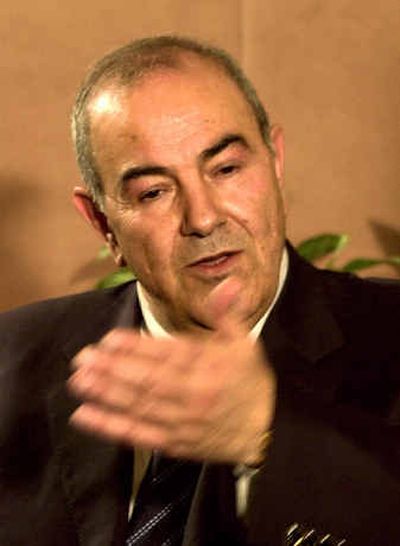Attacks kill U.S. soldier, 20 others

BAGHDAD, Iraq – In a series of attacks against U.S. forces and the Iraqi police who aid them, insurgents killed at least 21 people over a 24-hour period, American and Iraqi officials said Sunday. One U.S. soldier was among the dead.
The latest burst of violence underscores the difficulties faced by U.S. and Iraqi authorities as they prepare for a formal hand-over of power at the end of the month.
Most Iraqis have been disappointed by what they perceive as U.S. authorities’ failure to provide public order during more than a year of U.S.-led occupation.
Violence on the ground overshadowed diplomatic and military efforts to ensure a smooth hand-over of power to Iraqis on June 30.
At least nine people died and more than 30 were hurt when a powerful car bomb detonated outside the U.S. air base at Taji, about 12 miles north of the capital. The injured included three U.S. soldiers, the military said.
Separately, a U.S. soldier died in a mortar attack early Sunday at a U.S. base near Balad, also north of Baghdad.
Sadr City, a sprawling slum on Baghdad’s eastern outskirts, was the site of a brazen attack by insurgents Sunday. The impoverished area, home to about 3 million people, has been a focal point of fighting between U.S. troops and members of a militia loyal to Shiite cleric Muqtada al-Sadr.
In Sunday’s attack, assailants directed heavy gunfire at an Iraqi police station but then halted fire long enough to inform those inside they had a single chance to leave. Then they blew up the building, according to witnesses and Iraqi officials.
In a similar attack Saturday afternoon, an Iraqi police station was targeted in the town of Musayib, about 50 miles south of Baghdad. At least 11 Iraqi police were killed. On Sunday, rescuers, including U.S. troops, combed the wreckage for bodies.
The roof of the police station caved in, and only its outer walls were left standing. Amid the rubble lay the partial sole of a shoe and the tattered remains of a police uniform shirt bearing a lieutenant’s star.
Witnesses said the gunmen split into two groups, one dressed in police uniforms and carrying a large box, possibly filled with explosives. The second group, in civilian garb, opened fire on a gas station across the road, then approached the police post and seized assault rifles from its guards.
“I saw the man who shot me – he was dressed as a first lieutenant,” said 20-year-old police Sgt. Tuama Salih Ali. “I lay on the ground and pretended to be dead . . . I heard them shooting my colleagues.”
In Baghdad, two heavy explosions were heard late Sunday, but their origin was not immediately apparent.
Meanwhile, more details emerged Sunday about an assault a day earlier against foreign contractors working for a U.S. security company on the increasingly dangerous road between the capital and its airport.
The company, the North Carolina-based Blackwater USA, confirmed without providing details that four of its employees – two Americans and two Poles – were killed in Saturday’s ambush.
Four other Blackwater workers died in the restive town of Fallujah, west of Baghdad, at the end of March, which led to a three-week battle between insurgents and U.S. forces.
An e-mailed claim of responsibility, reported by the Associated Press, said a group called Unification and Holy War had carried out the rocket attack against the contractors’ vehicles, and also the car bombing outside the U.S. base at Taji. The claims could not be verified .
Most of those hurt and killed in the Taji blast were said to be Iraqi civilians waiting to go to jobs inside the base.
Also Sunday, the U.S. military freed 320 prisoners in the fourth such release since April, when the Abu Ghraib prison near Baghdad became the center of an ongoing outcry over the abuse of Iraqi detainees by U.S. forces guarding them. The latest release brings the number of Abu Ghraib prisoners down to approximately 3,100.
In the southern city of Najaf, a fledgling truce between the U.S. military and al-Sadr’s militia appeared to be holding. In Najaf and the nearby city of Kufa, those in possession of weapons lined up to take part in an offer to turn over guns to the authorities in return for cash.
Holders of Kalashnikov assault rifles were given $100; mortar shells drew $60 and rocket-propelled grenade launchers went for $250, residents said.